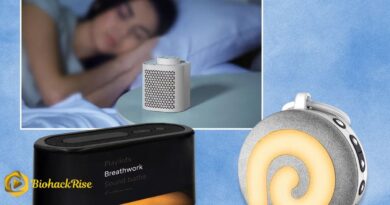Natural Supplements for Sleep Biohacking That Work Fast
Sleep biohacking might sound like something out of a sci-fi novel, but it’s actually a very grounded approach to improving your sleep using science, habits and supplements.
Imagine being able to fall asleep faster, stay asleep longer and wake up feeling refreshed, every single morning. That’s the promise of sleep biohacking.
It involves paying attention to how your body responds to different stimuli, foods, light exposure and natural substances, then using that knowledge to improve your sleep quality.
Why Natural Supplements are Essential in Biohacking Sleep?
Let’s face it, modern life is a sleep killer. Screens, stress, caffeine, and even noise pollution have wrecked our natural ability to fall and stay asleep.
That’s where natural supplements come into play. They support your body’s own processes instead of overpowering them like some pharmaceutical sleep aids.
Unlike prescription medications that often come with heavy sedation, grogginess, or dependency risks, natural sleep supplements aim to balance and enhance your body’s own chemistry.
These include herbs, amino acids, and even minerals that promote relaxation, lower anxiety, and increase melatonin production.
The Science Behind Sleep and Circadian Rhythm
Before diving into specific supplements, it’s important to understand how sleep works. Sleep is not a single uniform state, it’s a dynamic process with distinct stages. Each night, your body cycles through four main stages of sleep, grouped into two categories: Non-REM (NREM) and REM sleep.
Here’s a quick breakdown:
Stage 1 (N1): This is the lightest stage of sleep, a transitional period that lasts a few minutes.
Stage 2 (N2): Light sleep continues, and heart rate slows. Brain waves begin to slow as well.
Stage 3 (N3): Deep sleep begins. This is when the body repairs and regenerates tissues, builds bone and muscle, and strengthens the immune system.
REM (Rapid Eye Movement) Sleep: The dream stage. It’s crucial for cognitive functions like memory, learning, and emotional processing.
How Circadian Rhythms Affect Sleep Quality?
Your body is run by an internal clock called the circadian rhythm, and it controls your sleep-wake cycle.
It tells you when to feel sleepy, when to be alert, and even when to release hormones like cortisol and melatonin. It runs on a 24-hour cycle, heavily influenced by light exposure, meal timing, and physical activity.
By staying up late scrolling through your phone, or working night shifts, can destroy your sleep quality.
When your circadian rhythm is off, even eight hours of sleep can leave you feeling drained. On the flip side, syncing your routine to your circadian rhythm can help you fall asleep faster and wake up feeling more refreshed.
Top Natural Supplements for Sleep Enhancement

Melatonin is perhaps the most famous natural sleep supplement, and for good reason. It’s a hormone your body naturally produces in response to darkness.
When the sun goes down and you reduce your light exposure, especially blue light, your brain starts pumping out melatonin, signaling to your body that it’s time to wind down.
For biohackers, melatonin is a powerful tool to control sleep onset. Taking a small dose (usually between 0.3 to 1 mg) about 30–60 minutes before bed can help shift your circadian rhythm earlier and help you fall asleep faster. Larger doses are sometimes used, but they can lead to grogginess or even disrupt your sleep cycles.
Melatonin is particularly helpful when:
- You’re dealing with jet lag.
- Your sleep schedule has been thrown off by late nights.
- You’re trying to wake up earlier and need help resetting your internal clock.
Magnesium: Relaxation and Nervous System Support
Magnesium is an underrated powerhouse when it comes to sleep support. This essential mineral is involved in over 300 biochemical reactions in the body.
When magnesium levels are optimal, your body finds it easier to relax, reduce inflammation and transition into a restful state.
There are several forms of magnesium, but not all are created equal for sleep. Magnesium glycinate and magnesium threonate are particularly effective for sleep support and anxiety reduction.
Glycinate is known for its calming effects without causing digestive discomfort, while threonate crosses the blood-brain barrier to directly influence brain function.
Other benefits include:
- Reducing nighttime muscle cramps
- Improving sleep quality in those with insomnia
- Enhancing deep sleep phases
Valerian Root: A Herbal Sedative with Ancient Roots
Valerian root has been used for centuries as a natural sedative and anxiety reducer. Derived from the Valeriana officinalis plant, it works by increasing GABA levels in the brain, similar to how benzodiazepines operate but without the dependency or harsh side effects.
Valerian doesn’t knock you out immediately; instead, it subtly calms the nervous system, making it easier to drift off. It’s particularly useful for those who suffer from stress-induced insomnia or have trouble falling asleep due to anxiety.
Studies have shown that valerian root can:
- Improve sleep latency (the time it takes to fall asleep)
- Increase deep sleep (N3 stage)
- Reduce nighttime awakenings
L-Theanine: Promoting Relaxation Without Drowsiness
Ever wonder why a cup of green tea can help you relax even though it contains caffeine? That’s thanks to L-theanine, an amino acid found in tea leaves that promotes a state of relaxed alertness.
It’s a unique compound because it helps you wind down without putting you to sleep, making it an excellent pre-bedtime supplement for those who can’t “shut off” their brains.
L-theanine boosts alpha brain waves, which are associated with calm, meditative states. This makes it a go-to for reducing mental chatter and pre-sleep anxiety. It also helps lower cortisol levels, which is crucial if stress is sabotaging your sleep.
Some of the benefits of L-theanine include:
- Enhancing the quality of sleep, especially REM
- Promoting mental clarity and reducing anxiety
- Improving focus during the day (when taken in the morning)
- Counteracting the stimulating effects of caffeine (great for afternoon coffee lovers)
Glycine: The Amino Acid for Deeper Sleep
Glycine is a non-essential amino acid that plays a surprising role in improving sleep quality. While it may not get the spotlight like melatonin or magnesium, glycine has a unique mechanism: it helps lower your core body temperature, a key physiological cue for your body to initiate sleep.
In studies, people who took glycine before bed reported:
- Falling asleep faster
- Experiencing deeper sleep
- Waking up feeling more refreshed and less groggy
Glycine also increases serotonin levels in the brain, which indirectly supports melatonin production.
Plus, it helps regulate blood sugar, reduces inflammation, and supports cognitive function. All of these contribute to a smoother, more rejuvenating night’s rest.
CBD and Hemp-Derived Cannabinoids
CBD, short for cannabidiol, is one of the most talked-about natural sleep aids in recent years and for good reason.
Derived from the hemp plant, CBD doesn’t get you high like THC, but it does interact with your body’s endocannabinoid system to help regulate mood, pain and yes, sleep.
So, how does CBD help you sleep? It primarily reduces anxiety, pain and inflammation, all of which can interfere with falling and staying asleep. If you’ve ever found yourself lying awake at 2 AM with a racing mind or body discomfort, CBD might be your best friend. It doesn’t sedate you but rather helps calm the body and mind enough to allow natural sleep to take over.
Some key benefits of CBD for sleep biohackers include:
- Lowering cortisol levels, especially if taken in the evening
- Promoting deeper REM and NREM sleep
- Easing symptoms of insomnia, PTSD, or chronic pain
- Providing a non-habit-forming alternative to pharmaceuticals
Combining Supplements for Maximum Effectiveness

Individually, natural sleep supplements offer benefits, but when stacked intelligently, they can create powerful synergistic effects. This technique is often referred to as “smart stacking,” and it’s a core strategy for sleep biohackers.
Here are some proven stacks that enhance sleep:
- Magnesium + L-Theanine + Glycine
This trio works to calm the nervous system, promote muscle relaxation, and lower core body temperature. It’s perfect for reducing stress and promoting deep sleep.
- Melatonin + CBD + Valerian Root
A great combo for those who struggle with both falling and staying asleep. Melatonin sets the sleep signal, CBD calms the mind, and valerian promotes sedation.
- Magnesium + GABA + Passionflower
Ideal for reducing anxiety-driven insomnia. This stack boosts calming neurotransmitters and balances brain activity before bed.
- Ashwagandha + L-Theanine (AM) and Magnesium + Glycine (PM)
A full-day biohacking plan. Use adaptogens in the morning to manage stress and sleep-inducing supplements at night for maximum recovery.
Dosage and Timing: When and How to Take Them?
Even the best supplements won’t work if you take them at the wrong time. Timing is everything in sleep biohacking. Every supplement has an onset period and taking it too early or too late can blunt its effect or worse, mess up your natural rhythm.
Here’s a general timing guide for popular supplements:
- Melatonin: 30–60 minutes before bed. Use sparingly and only when resetting your sleep schedule.
- Magnesium: 1–2 hours before sleep. Pairs well with a calming ritual like a warm bath or meditation.
- Valerian Root: 45–60 minutes before sleep. Best not to take with alcohol or sedatives.
- CBD: 30–90 minutes before bed. Start with 10–20 mg and adjust based on effectiveness.
- L-Theanine: Can be taken 30 minutes before bed or earlier in the evening to reduce anxiety.
- Glycine: 3 grams, about 30 minutes before sleep. Works best on an empty stomach.
Some tips for better dosing:
- Avoid combining multiple sedatives unless you’re sure how your body reacts.
- Stay consistent. Natural supplements often need a few nights of use to become fully effective.
- Don’t overdose. More isn’t always better and can disrupt your sleep cycles.
Lifestyle Hacks to Supercharge Your Supplements
You can pop all the supplements in the world, but if you’re blasting your face with blue light before bed, your sleep’s still going to suffer. Blue light from screens disrupts melatonin production by tricking your brain into thinking it’s daytime. It suppresses your body’s natural sleep signal.
Sleep biohackers use blue light blocking glasses, apps like f.lux or Night Shift, and old-fashioned discipline (like turning off devices an hour before bed) to manage this. Creating a wind-down routine—dim lights, read a book, stretch, can do more than any pill alone.
In addition, good sleep hygiene practices include:
- Keeping your room dark and cool
- Going to bed and waking up at the same time daily
- Avoiding caffeine and alcohol 6 hours before bed
- Using white noise machines or blackout curtains
Optimizing Your Bedroom for Better Sleep
Your bedroom should be a sanctuary for rest, a quiet retreat that signals to your body and brain: it’s time to sleep. No matter how optimized your supplement stack is, if your environment is chaotic or poorly designed, deep sleep will remain elusive.
Start with temperature. The ideal room temperature for sleep is between 60–67°F (15–19°C). A cooler room encourages your body’s natural drop in core temperature, which is necessary to enter deep sleep. Use breathable bedding, cooling mattresses or fans if needed.
Next, let’s talk about light exposure. Any form of ambient light, even a blinking LED from your TV, can interfere with melatonin production.
Consider blackout curtains, eye masks and turning off all electronic devices. Even a subtle nightlight can throw off your internal clock.
Here’s a checklist to biohack your bedroom:
- Mattress: Medium-firm with good back support
- Pillows: Aligned with your sleep position (back, side, stomach)
- Bedding: Natural fibers like cotton or bamboo to regulate heat
- Lighting: Warm-toned lamps, Himalayan salt lamps, or dimmable smart lights
- Air Quality: Air purifiers, plants (like snake plant or peace lily), and a well-ventilated room
Timing Meals and Intermittent Fasting
Meal timing has a profound impact on your circadian rhythm. Eating too close to bedtime can spike blood sugar, activate digestion and keep your body in “awake” mode long after your head hits the pillow. This is where intermittent fasting or simply early dinners can boost your sleep game.
Certain foods and nutrients can either help or hurt your sleep:
- Sleep-friendly foods: turkey (tryptophan), kiwi, tart cherry juice (natural melatonin), almonds, bananas, and oatmeal.
- Sleep disruptors: sugar, caffeine, spicy foods, alcohol, and heavy meals high in fat or protein close to bedtime.
Safety, Side Effects and Precautions
While natural sleep supplements are generally safe, everybody is different. What knocks one person out might leave another wide awake. That’s why biohacking is all about self-experimentation and tracking.
Some people are slow metabolizers of melatonin or caffeine, others might have sensitivities to herbs like valerian or CBD. For example, valerian can cause vivid dreams or grogginess in sensitive users and magnesium in high doses can lead to digestive issues.
Here’s how to biohack safely:
- Start with the lowest effective dose
- Introduce only one supplement at a time
- Track effects using a sleep diary or wearables
- Avoid taking multiple sedatives together unless you’ve tested each alone
When to Consult a Professional?
If you’ve been trying various supplements and sleep hacks for weeks without improvement, it might be time to bring in a sleep specialist. Chronic insomnia, sleep apnea, restless leg syndrome, or anxiety disorders can all require professional care.
Consulting a doctor or naturopath can help:
- Rule out underlying conditions
- Customize a supplement protocol based on your biology
- Recommend lab testing (e.g., magnesium or cortisol levels)
- Adjust medication that may be interfering with sleep
FAQ’s
Are natural sleep supplements safe for daily use?
Yes, many are safe for daily use, especially magnesium, L-theanine and glycine.
How long do natural supplements take to work?
Some, like L-theanine and melatonin, work within 30–60 minutes.
Can I take multiple supplements at the same time?
Yes, stacking is common in sleep biohacking. Just ensure you’ve tested each supplement individually first and monitor how your body responds to combinations.
Do natural sleep aids interfere with REM sleep?
Most natural supplements support rather than suppress REM sleep. In fact, ingredients like magnesium and CBD can enhance it.
Conclusion
Natural supplements for sleep biohacking aren’t just trendy, they’re rooted in science and increasingly backed by data. Whether you’re using melatonin to reset your rhythm, magnesium to calm your nerves, or glycine to dive into deeper sleep, each supplement has its own unique role to play.
The magic happens when you combine the right supplements with smart habits. That means optimizing your bedroom, managing light and meal timing, and staying consistent. When you treat your body like a system and tune it mindfully, incredible changes follow.




